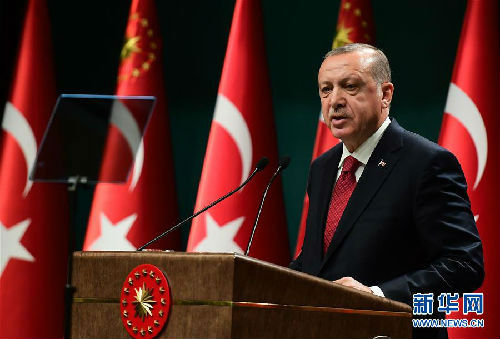Erdogan's foreign policy choices and the role of BRI
- By George N. Tzogopoulos
 0 Comment(s)
0 Comment(s) Print
Print E-mail China.org.cn, July 19, 2018
E-mail China.org.cn, July 19, 2018

Two years after the failed coup d'état in Turkey, President Recep Tayyip Erdogan enjoys unprecedented political success. In 2017 he won the critical constitutional referendum and this year he was elected president while his Justice and Development Party (AKP) will remain in power in a ruling coalition with the Nationalist Movement Party (MHP).
At the same time, the opposition seems unable to pose serious obstacles to Erdogan's domination who will have greater power than any other Turkish leader for decades. If there is an important hurdle the Turkish president needs to overcome, this is not related to politics but to the course of the national economy which has already taken a downward trajectory.
As far as foreign policy is concerned, Ankara is expected to maintain a good relationship with Washington despite disagreements over the extradition of Cleric Fethullah Gulen and the detention of some American citizens in Turkey. The two sides are elaborating on the implementation of a road map for the Syrian city of Manbij which shows that they are able to reach compromises on difficult themes. Although the result is not yet clear, some progress for the withdrawal of Kurdish military forces from the region has been already made.
Erdogan and his American counterpart Donald Trump met on the occasion of the recent NATO Brussels summit amid fears that Turkey could cause problems to the North-Atlantic Alliance. The Russian-Turkish agreement on the basis of which Ankara will buy the S-400 defense system from Moscow constitutes an example. "NATO's real crisis is Turkey, not Trump" was the title of a recent op-ed published on the website of Bloomberg. Concerns are exaggerated though. Erdogan is arguably determined to challenge the fundamental and historical principles of Turkish foreign policy. He prefers rather to diplomatically bargain.
Furthermore, the Turkish President knows the limits of his maneuvering in international affairs. This does not only refer to the evolution of American-Turkish relations but also to Russian-Turkish relations. When Erdogan and his Russian counterpart Vladimir Putin were at odds for a period of approximately eight months – from November 2015 until July 2016 – the former realized the real consequences for the Turkish economy and decided to apologize to the latter. This paved the way for the rapprochement between the two and generated new business and energy accords.
Relations between Turkey and the European Union will be also significant for Erdogan. As long as the Turkish president can successfully deal with the economic crisis, he is not expected to soften his antagonistic rhetoric. However, if markets prove to be ruthless, he will have no other choice but to approach countries such as Germany to attract new investments. Such a scenario will weaken Ankara's position vis-à-vis Brussels on demands such as the visa-free travel for Turkish citizens in the EU and the insistence on the non-release of some European citizens from Turkish prisons.
From another perspective, the country which will be central for Erdogan's foreign policy calculations is China. By looking towards the East, the Turkish president is finding new partners to play down some criticism from the West. More importantly, he is counting on Chinese investments in several fields.
His commitment to blocking the easy movement of Muslim Uighurs from Turkey to the Chinese region of Xinjiang has given the green light for an even closer collaboration. Only a few weeks ago, for instance, Turkish Airlines secured a loan from the Industrial and Commercial Bank of China (ICBC) to construct some facilities in the new Istanbul airport. The passage of the Belt and Road Initiative from Turkey is facilitating the realization of several infrastructure works. Daily Sabah newspaper cites data from the Turkish Economy Ministry and reports that Chinese firms operating in Turkey had neared 1,000 by last April.
The implementation of the Belt and Road Initiative could have an additional long-term impact on Turkish foreign policy. As this Initiative fosters connectivity among different countries and seeks to cement multilateral collaboration and yield win-win results, it has the potential to function as a new, promising and ambitious model in international relations.
Turkey is located in a turbulent region and is forced to be involved in serious troubles with many of its neighbors not only in the Middle East but also in the Eastern Mediterranean, including Cyprus and Greece. The Chinese model should inspire peaceful solutions instead of zero-sum choices that might even lead to military accidents.
George N. Tzogopoulos is a columnist with China.org.cn. For more information please visit:
http://www.china.org.cn/opinion/GeorgeNTzogopoulos.htm
Opinion articles reflect the views of their authors, not necessarily those of China.org.cn.






Go to Forum >>0 Comment(s)